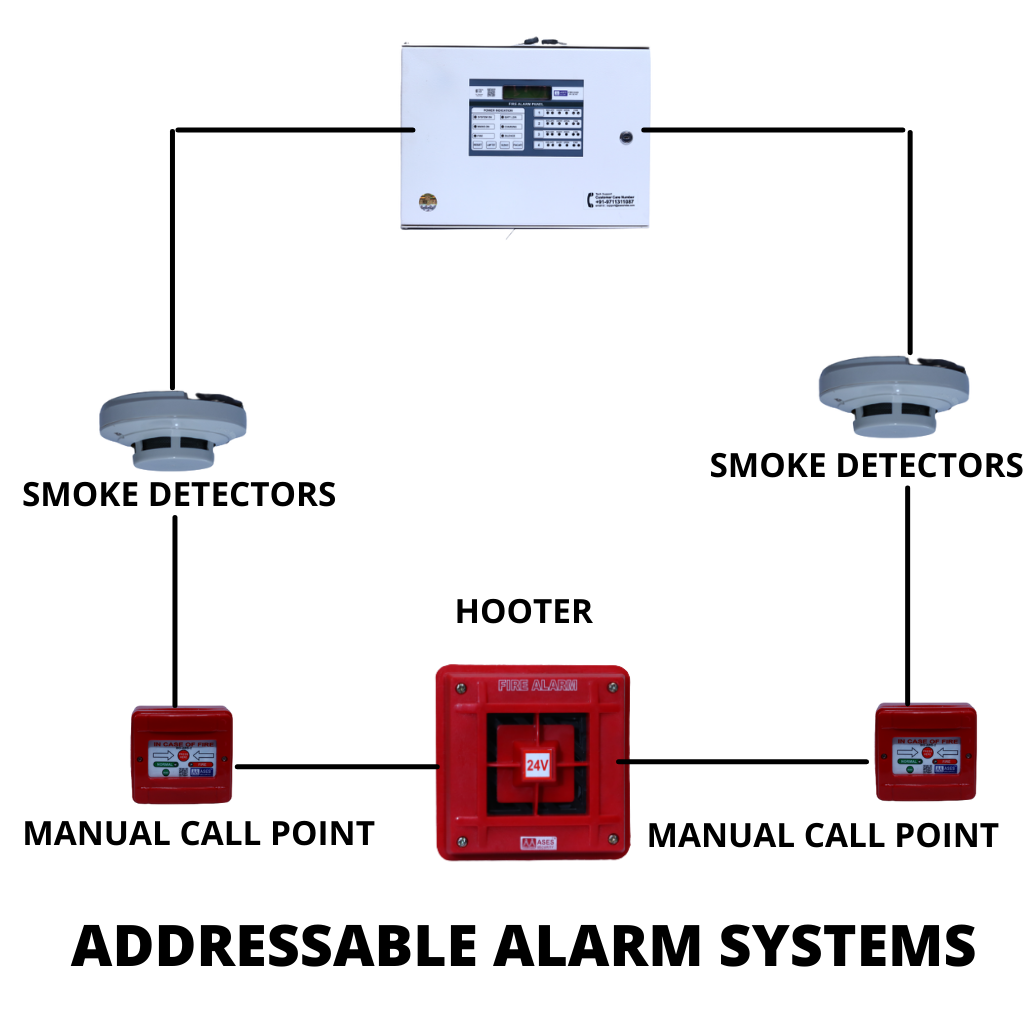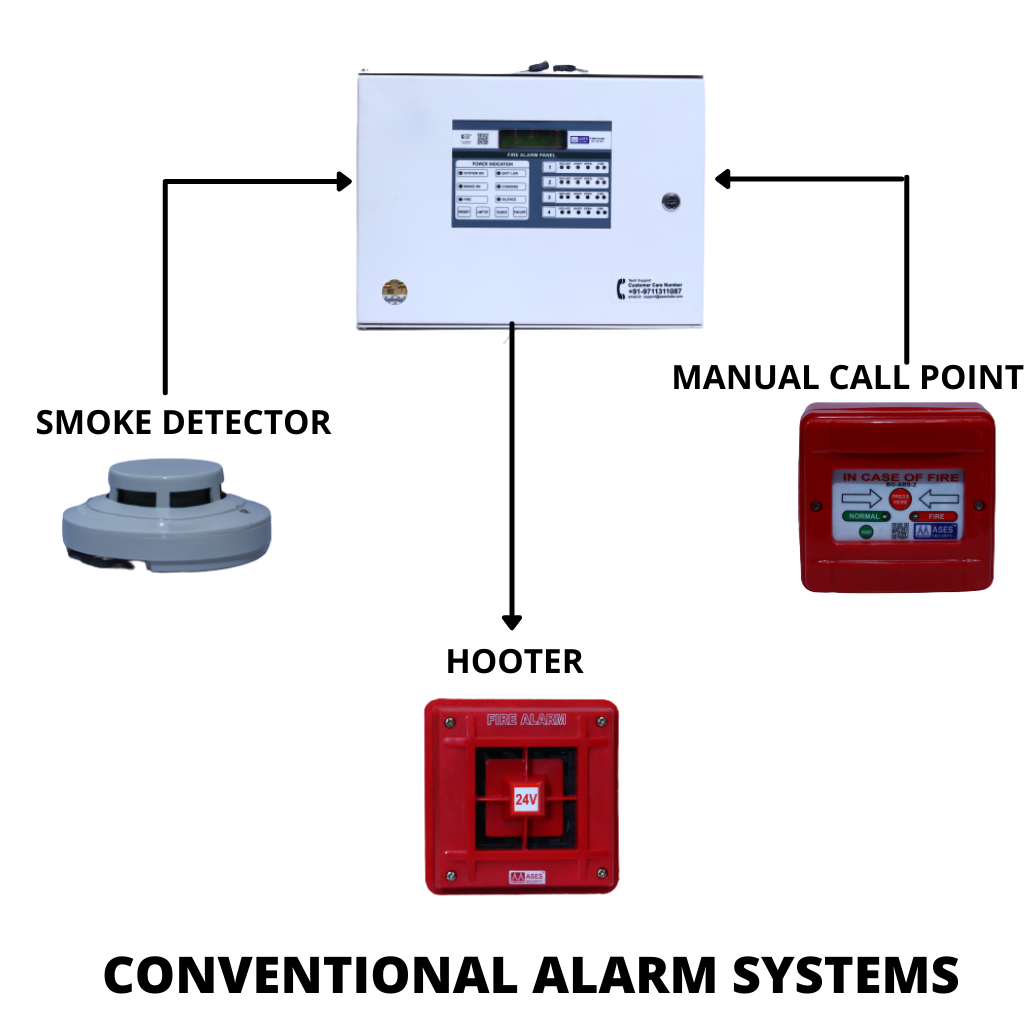there are four types of fire alarm systems
ADDRESSABLE

An addressable fire alarm comprises a series of fireside detectors and devices connected back to a central instrument panel.
conventional

A CONVENTIONAL FIRE ALARM CONTAIN A SERIES OF ONE OR MORE CIRCUITS, CONNECTED WITH SENSORS IN PARALLEL. EACH DEVICE IS CONNECTED WITH AN INSTRUMENT PANEL HAVING ITS OWN WIRING
intelligent

intelligent control systems are more sophisticated than conventional fire alarm systems and are ready to provide a particular location of the event.
wireless

A wireless fire alarm system is an essential safety device for any home or business.
ADDRESSABLE

An addressable fire alarm comprises a series of fireside detectors and devices connected back to a central instrument panel.
Each device has an address or location with addressable systems, enabling the precise detector that was triggered to be quickly identified. This makes the addressable alarm systems ideal for giant buildings, particularly commercial premises cover a good area
One of the most important advantages of addressable fire alarm systems is that they will be configured so that a selected action triggers a specific response.
The latest generation of addressable fire alarm systems is much more efficient than the previous ones. This means they provide better safety at lower costs to the companies that use them, but also to their customers who live in areas with a high probability of fires.
The most obvious benefit of addressable fire alarms is that they enable you to keep track of which areas in your building are protected. As such, if there is a problem with one of the alarms also monitor the air for any contamination present will trigger a warning alerting operators to investigate or rectify ant issues before false activation
CONVENTIONAL
A CONVENTIONAL FIRE ALARM CONTAIN A SERIES OF ONE OR MORE CIRCUITS, CONNECTED WITH SENSORS IN PARALLEL. EACH DEVICE IS CONNECTED WITH AN INSTRUMENT PANEL HAVING ITS OWN WIRING
Conventional fire alarm systems, also known as ionization smoke alarms, are the most common type of residential fire alarm system. Ionization smoke alarms consist of a sensor to detect smoke and an alarm that warns residents in the event of a fire. These kinds of alarms only trigger when they sense particles that indicate the presence of fire. In case there is no particle present, then no alarm will sound. They can be very sensitive and often go off when there is nothing wrong at all.
Conventional fire alarms are considered to be a budget-conscious option for little buildings, like coffee shops or retail stores, because the upfront cost is considerably less. additionally, the wiring of the system enables security to spot general zones of fireside threat and evacuate staff accordingly. However, thanks to the extensive wiring involved in conventional systems, they take more man-hours to put in and are susceptible to signal mishaps and false alarms which may be tedious, costly and time-consuming. Further, as a consequence of frequent false alarms, occupants may become apathetic to the sound of a fireplace alarm and hesitate to reply to real fire threats in the event they occur.

INTELLIGENT

intelligent control systems are more sophisticated than conventional fire alarm systems and are ready to provide a particular location of the event. These systems can range from simple using just one device to extremely complex housing several hundred devices. For larger applications, intelligent fire alarms are the simplest choice.
These devices differ from their conventional counterparts because each device constantly communicates with the instrument panel. Within seconds, alarms, supervisory and trouble conditions are alerted to the instrument panel and a particular location of the event is displayed. Conventional alarm systems only “communicate” when there’s an occasion.
Alarm systems are designed to protect your home and your family. But that doesn’t mean they can’t be effective at protecting other things you value, too. With some creativity and strategic planning, a fire alarm system can become an integral part of any smart home. Fire prevention is no longer just about extinguishing flames and keeping smoke out, but also reducing the amount of damage caused by these events in the first place.
The benefit of Intelligent Fire Alarms is the reaction time taken by such to trigger alarm are precise. They provide flexibility and communicates with the instrument panel continuously
WIRELESS
A wireless fire alarm system is an essential safety device for any home or business. They alert residents to a fire and give firefighters the exact location of the fire so they can respond quickly and more effectively. The best part about wireless fire alarms is that you don’t have to pay for a service or maintenance contract, as many systems are self-maintaining with no monthly fees.
A wireless fire alarm system requires no wiring whatsoever since it uses radio frequencies to transmit signals between devices. You can install one easily in your home or business by setting up a control panel in the main area of your building and installing smoke detectors, heat detectors, and other warning devices. Since no wiring will be involved.
wireless fire alarms are extremely sophisticated and reliable with multi-frequency links that won`t allow disruption of signal and maintain better signal strength. this instrument panel are designed to communicate with sensors or detectors using radio frequency signals.
More expensive than other sorts of fire alarms, they’re considerably more flexible than any of the wired systems. they’re also less vulnerable to fire than wired installations which are in peril of circuit damage that would compromise the whole system.

